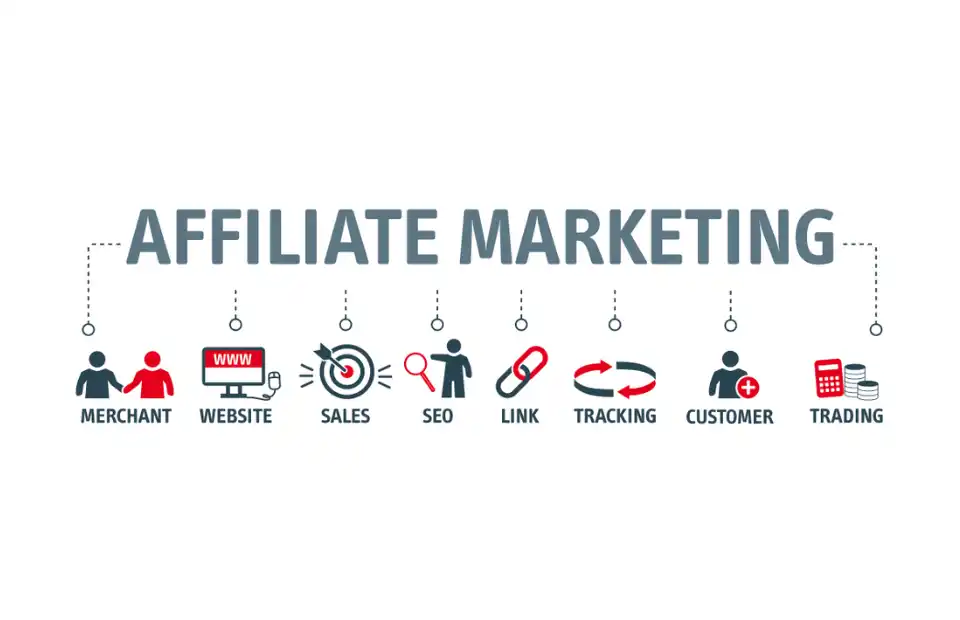Online business is at its peak in this technological world! You can earn money online by participating in affiliate marketing. It requires little to no investment to get started and has the potential to generate passive income. Affiliate marketing can be a great source of extra income with the right strategy.
All types of Marketing Managers need to understand that affiliate marketing is the basis of the online business ecosystem. From affiliate marketing’s definition to its benefits in today’s digital era, we all discuss affiliate marketing here.
- Affiliate Marketing – A Free Virtual Event
- Most Famous Free Virtual Events for Affiliate Marketing
- 10 Benefits of Affiliate Marketing
- How Affiliate Marketing Works?
- 8 Types of Affiliate Marketing
- Best Affiliate Programs
- How to Choose the Best Affiliate Program
- How to do Affiliate marketing?
- Step 1: Get Knowledge about Affiliate Marketing
- Step 2: Identify Your Niche and Audience
- Step 3: Research and Choose an Affiliate Program
- Step 4: Choose or create a Platform
- Step 5: Generate Quality Content
- Step 6: Use SEO Strategies
- Step 7: Build Trust with Your Audience
- Step 8: Select Products Strategically
- Step 9: Track and Analyse Performance
- Step 10: Build Relationships
- Conclusion
- Frequently Asked Questions on Affiliate Marketing
Affiliate Marketing – A Free Virtual Event

Affiliate marketing is a performance-based marketing strategy used by someone to promote other people’s products and gain commissions.
The person who promotes the product or brand is often called an Affiliate. Affiliate marketing become very popular these days. The company will pay for each client, which comes after the marketing campaigns done by an affiliate.
Affiliate marketing is the process by which affiliates and merchants collaborate to extend the reach of products through the use of digital platforms.
Most Famous Free Virtual Events for Affiliate Marketing
Many organizations and large platforms regularly host free virtual events focusing on affiliate marketing. Here are the top famous platforms and events:
Affiliate Summit
Affiliate Summit is a well-known organization in the affiliate marketing industry. This organization host virtual events, webinars and summits to cover all aspects of affiliate marketing.
ClickBank University
ClickBank is the most popular platform known for affiliate marketing. This platform occasionally offers free virtual events and webinars. In these events, professionals cover topics like marketing strategies and product promotion.
Wealthy Affiliate
It is an online platform that provides proper training and resources for affiliate marketers. They have their experts who share their knowledge and experience with other affiliates.
Rakuten Advertising
Rakuten Advertising is a global affiliate marketing network that organizes webinars and virtual events. In these free virtual events, they tell about the industry trends, best practices for affiliate marketing and strategies for success.
Affilorama
Affilorama is an online platform which offers complete training and gives effective resources for affiliate marketers. They usually charge a fee but sometimes conduct free webinars and virtual events to cover various aspects of affiliate marketing.
AWIN
It is an extensive network that provides services related to affiliate marketing. They host many free virtual events to educate marketers and affiliates to follow the new industry trends and best practices in the marketing industry.
Digital Marketer
DigitalMarketer is a website that provides education about digital marketing. They occasionally offer free webinars and virtual events about Affiliate marketing trends and strategies.
You must attend these free virtual events to enhance your knowledge and skills. You also join these free virtual events to discuss your problems or issues related to affiliate marketing with professionals and experts. It is very good practice to stay updated with the new industrial trends and updates.
10 Benefits of Affiliate Marketing
Affiliate marketing is a dynamic and versatile online business model. It offers many benefits for both affiliates and merchants, by creating a symbiotic relationship.
1. Cost-Effective
In Affiliate marketing, merchants only pay for actual sales or leads generated through affiliate efforts. Affiliate marketing allows businesses to control their marketing budget efficiently as it focuses on actual outcomes rather than upfront expenses.
2. Global Audience
Through affiliate marketing, we can promote products or services globally worldwide. It increases productivity, and we get more clients. There is no doubt that our brand or company is well known to everyone. We can get a global audience through affiliate marketing strategies.
3. Low Entry Barriers
Affiliate marketing has low entry barriers, making it accessible to everyone with different experience levels. Aspiring affiliates can join programs without the need for extensive startup capital. It allows for a relatively straightforward entry into the online business field.
4. Potential Passive Income
Affiliate marketing is used to generate passive income. Affiliates can continue to earn commissions on sales or leads generated by their initial efforts, even when they are not actively promoting the products or services.
5. Diverse Product Range
Affiliates can promote a wide range of products and services. Having a clear understanding of their interests and expertise allows them to align their promotional efforts with them. Also, it enables them to understand their target audience’s preferences.
6. Flexibility and Autonomy
Affiliate marketing provides flexibility and autonomy. Affiliates have control over their strategies, content creation, and promotional channels. This flexibility is very important for creativity and innovation in marketing approaches.
7. Decision Making
The digital nature of affiliate marketing provides opportunities for data collection and analysis. Affiliates use different analytics tools to track the performance of their campaigns. It helps them to understand audience behaviour and make effective decisions to optimize their strategies.
8. Collaboration
The relationship between affiliates and merchants is inherently cooperative. Merchants benefit from increased sales and brand exposure, while affiliates earn commissions for their promotional efforts. This collaboration helps to create a mutually beneficial ecosystem.
9. Scalability
Affiliate marketing is scalable, allowing affiliates and merchants to grow their operations. As affiliates gain experience and expand their reach, they can collaborate with multiple merchants. Similarly, merchants can scale their affiliate programs to reach a broader audience.
10. Performance-Based
The performance-based nature of affiliate marketing allows affiliates to optimize their strategies continuously.
How Affiliate Marketing Works?

As we know, people use a lot of Marketing Tools and budgets to work their marketing strategies effectively. But for Affiliate Marketing there are two things necessary.
- Affiliate Marketers
- Merchants
Affiliate marketers make a connection bridge between consumers and products or services. Understanding their role and strategies is very important to improve your online presence in businesses.
Merchants are the persons who provide affiliates with products or services they promote.
Affiliate marketing involves a relationship between affiliates and merchants. Affiliates, who can be bloggers, influencers, or content creators, promote products or services on behalf of merchants through unique affiliate links. These links are equipped with tracking mechanisms that enable accurate monitoring of user interactions. The affiliate earns a commission when consumers purchase or complete a desired action.
8 Types of Affiliate Marketing
Affiliate marketing has different types, each has different business objectives and structure.
1. Pay-Per-Sale (PPS)
Affiliates earning commissions on each sale they refer earn commissions under Pay-Per-Sale models. There are several types of affiliate marketing, but this is the most common. Because Merchants only pay for actual sales, the cost is reduced.
2. Pay-Per-Click (PPC)
Affiliates earn a commission based on the number of clicks generated through their affiliate links and whether the referred users make a purchase. It suits merchants who focus on increasing website traffic or brand exposure.
3. Pay-Per-Lead (PPL)
Pay per lead (PPL) means affiliates receive compensation when their referrals take a specific action, such as signing up for a trial, completing a form, or subscribing to a newsletter. It is best for businesses looking to generate leads or gather customer information.
4. Revenue Share or Percentage-Based Commissions
Profits are earned by affiliates as a percentage of sales. The commission is calculated based on the revenue generated from the referred customer.
Encourages affiliates to focus on promoting high-value products or services.
5. Two-Tier Affiliate Marketing
Using this model, affiliates profit not only from their direct referrals but also from affiliates they recruit who generate leads or sales. It encourages affiliates to build and manage their sub-affiliate networks.
6. Multi-Level Marketing (MLM)
This model is also like two-tier marketing, MLM involves a hierarchical structure where affiliates earn commissions not only from their direct referrals but also from the referrals of their recruits. It creates a tiered system that helps in extensive network growth.
7. Loyalty or Reward Programs
Affiliates earn rewards or points for driving customer loyalty or repeat business to a merchant. It helps make long-term customer relationships and encourages affiliates to focus on customer retention.
8. Coupon and Deal Sites
Affiliates promote discounts, coupons, or special deals. They earn a commission for each sale using their unique promotional code or affiliate link. This is very useful for price-conscious consumers and can drive quick conversions.
Best Affiliate Programs
Some of the best affiliate marketing programs across different industries:
- Amazon Associates
- ClickBank
- ShareASale
- CJ Affiliate
- Rakuten Advertising
- ClickFunnels Affiliate Programs
- Bluehost Affiliate Program
- Shopify Affiliate Program
- Envato Market Affiliate Program
- eBay Partner Network
How to Choose the Best Affiliate Program

Always remember that the best affiliate program for you depends on your specific interests and the preferences of your target audience. It also depends on the alignment of the products or services with your niche.
You must consider factors like commission rates, cookie durations, and the reliability of the affiliate program’s tracking and payment systems.
Always review the terms and conditions of each program before joining to ensure they align with your promotional strategies and ethical standards.
How to do Affiliate marketing?

Affiliate marketing depends on a strategic approach, combining effective planning, content creation, and promotional techniques. By following these steps, you can do affiliate marketing quickly.
Step 1: Get Knowledge about Affiliate Marketing
First of all, you must know the basics of affiliate marketing. You must educate yourself about the terms, commission structure, and roles of the main elements of affiliate marketing.
Step 2: Identify Your Niche and Audience
Decide and choose the perfect niche according to your interests and expertise. You must also recognize your target audience to increase the effectiveness of your promotional efforts.
Step 3: Research and Choose an Affiliate Program
Search for the right affiliate marketing program that is according to your niche. You should also consider factors like commission rates, cookie duration, and product or service quality.
Step 4: Choose or create a Platform
Make your website or blog to promote affiliate products or services. Optimize and set your platform for better user experience and search engines.
Step 5: Generate Quality Content
Write content that attracts and provides value to your audience. Add a Product Review section, tutorials, and engaging articles related to your niche.
Step 6: Use SEO Strategies
Optimize your content or platform to improve its visibility in search engines. Use SEO strategies like relevant keywords, meta tags, and quality backlinks to enhance your website’s authoritativeness.
Step 7: Build Trust with Your Audience
Always remember your audience is everything. Build trust by being authentic and transparent. Create good affiliate relationships to maintain credibility.
Step 8: Select Products Strategically
Always choose the products or services that are relevant to your audience. Always give priority to promoting items that are aligned with your niche and provide real value.
Step 9: Track and Analyse Performance
Use different tracking tools that are provided by affiliate programs. Analyze your performance metrics like click-through rates, conversional rates, and overall earnings.
Always remember that success needs time and dedication, so be patient. Consistency in providing or writing valuable content, understanding your audience, and accepting new market trends are the key components of a successful affiliate marketing strategy.
Step 10: Build Relationships
In affiliate marketing, your success depends on how much audience you have. The number of audience increases if you have a good relationship with many people.
Focus on building relationships with influencers, bloggers, and other brands in your niche. As a result, your chances for success will be increased and you will reach a broader audience.
Conclusion
As technology grows very fast, everything becomes digital. Affiliate marketing is the best practice to promote your products and services online. With affiliate marketing programs, you get more traffic or audience, which leads to increased productivity and profit.
No doubt, with the emerging technologies, everything become automated. Many automation tools like YouTube automation tools and Amazon automation are introduced to increase productivity and save valuable time. Similarly, with new affiliate marketing programs, you can grow your business successfully in this competitive online digital world.
Frequently Asked Questions on Affiliate Marketing
Is affiliate marketing only suitable for experienced marketers?
No, affiliate marketing is suitable for both beginners and experienced marketers.
How much can one earn through affiliate marketing?
Earnings in affiliate marketing vary widely, depending on factors such as niche, effort, and product popularity.
Are there any costs involved in joining an affiliate program?
Some affiliate programs are free to join, but others may have associated costs, such as purchasing a product or paying for advertising.
Can I become an affiliate marketer without a website?
Yes, it’s possible to become an affiliate marketer without a website by using social media, email marketing, or other online platforms.
What are the legal considerations for affiliate marketing?
Legal considerations in affiliate marketing include compliance with disclosure requirements, respecting copyright and trademark laws, and adhering to privacy regulations.






Thank you I have just been searching for information approximately this topic for a while and yours is the best I have found out so far.